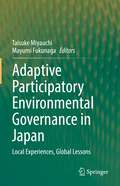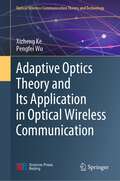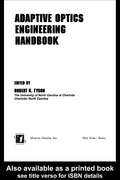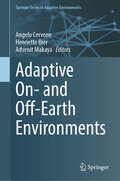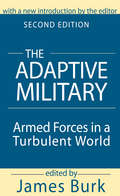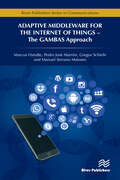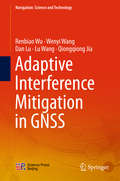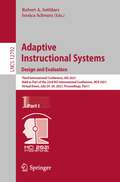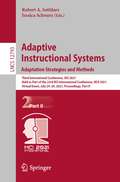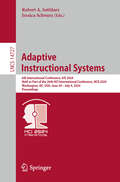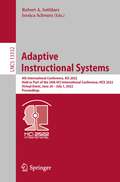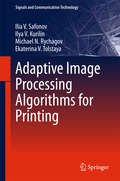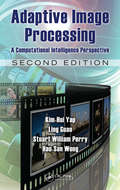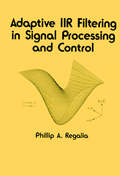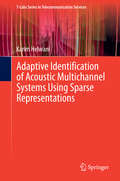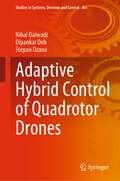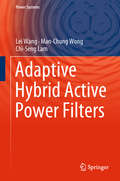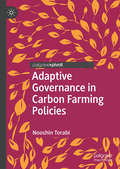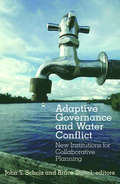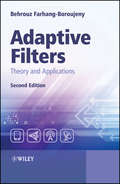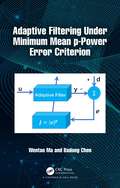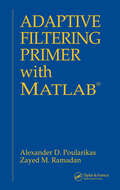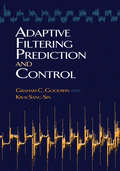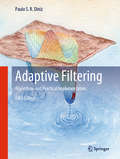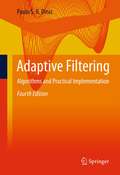- Table View
- List View
Adaptive Participatory Environmental Governance in Japan: Local Experiences, Global Lessons
by Taisuke Miyauchi Mayumi FukunagaThis book contributes to the theoretical and practitioner literature in environmental governance and sustainability of natural resources by linking case studies of the roles of narratives to the three key practices in local environmental governance: socio-political legitimacy in participation; collaboratively creating stakeholder-ness, and cultivating social and ecological capabilities. It provides numerous theoretical insights on legitimacy, adaptability, narratives, process-oriented collaborative planning, and among others, using in-depth case studies from historical and contemporary environmental issues including conservation, wildlife management, nuclear and tsunami disasters, and thus community risk, recovery, and resiliency. The authors are all practitioner-oriented scientists and scholars who are involved as local stakeholders in these practices. The chapters highlight their action and participatory-action research that adds deeper insights and analyses to successes, failures, and struggles in how narratives contribute to these three dimensions of effective environmental governance. It also shows how stakeholders’ kinds of expertise, in a historical context, help to bridge expert and citizen legitimacy, as well as spatial and jurisdictional governance structures across scales of socio-political governanceOf particular interest, both within Japan and beyond, the book shares with readers how to design and manage practical governance methods with narratives. The detailed design methods include co-imagination of historical and current SESs, designing processes for collaborative productions of knowledge and perceptions, legitimacy and stakeholder-ness, contextualization of contested experiences among actors, and the creation of evaluation standards of what is effective and effective local environmental governance.The case studies and their findings reflect particular local contexts in Japan, but our experiences of multiple natural disasters, high economic growth and development, pollutions, the nuclear power plant accident, and rapidly aging society provide shared contexts of realities and provisional insights to other societies, especially to Asian societies.
Adaptive Optics Theory and Its Application in Optical Wireless Communication (Optical Wireless Communication Theory and Technology)
by Xizheng Ke Pengfei WuThis book introduces in detail the theory of adaptive optics and its correction technology for light wave distortion in wireless optical communication. It discusses the adaptive control algorithm of wavefront distortion, proportional+integral control algorithm and iterative control algorithm, and double fuzzy adaptive PID control algorithm. It also covers the SPGD algorithm of adaptive optics correction, deformable mirrors eigenmode method of wavefront aberration correction, vortex beam wavefront detecting wavefront aberration correction, liquid crystal spatial light modulator wavefront correction, different wavelengths of Gaussian beam transmission wavefront differences in the atmospheric turbulence and correction and with wavefront tilt correction adaptive optics wavefront aberration correction. Various distortion correction methods are verified by experiments and the experimental results are analyzed. This book is suitable for engineering and technical personnel engaged in wireless optical communication, college teachers, graduate students and senior undergraduate students.
Adaptive Optics Engineering Handbook
by Robert TysonThis handbook supplies analytical tools for the design and development of adaptive optics systems to enhance their ability to adjust for atmospheric turbulence, optical fabrication errors, thermally induced distortions, and laser device aberrations. It provides recommendations for selecting, testing and installing a wavefront compensation system.
Adaptive On- and Off-Earth Environments (Springer Series in Adaptive Environments)
by Henriette Bier Angelo Cervone Advenit MakayaThis volume investigates the challenges and opportunities for designing, manufacturing and operating off-Earth infrastructures in order to establish adaptive human habitats. The adaptive aspects are considered with respect to the development of adequate infrastructures designed to support human activities. Given the limitations in bringing materials from Earth, utilisation of in-situ resources is crucial for establishing and maintaining these infrastructures.Adaptive on-and off-Earth Environments focuses, among other aspects, on the design, production, and operation processes required to build and maintain such off-Earth infrastructures, while heavily relying on In-Situ Resource Utilisation (ISRU). Such design, production, and operation processes integrate cyber-physical approaches developed and tested on Earth. The challenge is to adapt on-Earth approaches to off-Earth applications aiming at technology advancement and ultimately transfer from on- to off-Earth research. Thischallenge is addressed with contributions from various disciplines ranging from power generation to architecture, construction, and materials engineering involving ISRU for manufacturing processes. All chapters, related to these disciplines, are structured with an emphasis on computing and adaptivity of on-Earth technology to off-Earth applications and vice versa to serve society at large.
The Adaptive Military: Armed Forces in a Turbulent World
by Peter Jordan Caroline LloydWhen the cold war ended, many hoped it signified enhanced prospects for a more stable world. However, despite favorable political developments, the post-cold war period has been marked by turbulence, uncertainty, and challenge. The actions of rogue states such as Iraq and North Korea have made nuclear proliferation more unpredictable. Violence in Somalia and Bosnia has cast doubt on the viability of international peacekeeping arrangements. Hopes for expanding democratization have been dimmed by assertions that the values of liberal democracy and human rights are incompatible with non-Western cultures. The Adaptive Military describes how military security policies and practices have adapted to these new times and explains why such changes are necessary.The central argument is that current conflicts have been shaped by long-term trends, which increased the number and complexity of threats that the developed world is supposed to meet, and correspondingly decreased the stock of social and political options available to meet them.Although the authors differ in their assessments about the current prospects for peace and ways to maintain security, the issues they address are as critical as they were at the end of the Cold War. Mobilizing resources and political support for remote and difficult enterprises will always remain contentious, but if we recognize the hazard of letting violence run unopposed throughout the world, then we bear some responsibility to consider how it might be checked. This volume is an exercise of that responsibility. It will be of great interest to experts in military studies and international relations.
Adaptive Middleware for the Internet of Things: The GAMBAS Approach
by Marcus Handte Pedro José Marrón Gregor Schiele Matoses Manuel SerranoOver the past years, a considerable amount of effort has been devoted, both in industry and academia, towards the development of basic technology as well as innovative applications for the Internet of Things. Adaptive Middleware for the Internet of Things introduces a scalable, interoperable and privacy-preserving approach to realize IoT applications and discusses abstractions and mechanisms at the middleware level that simplify the realization of services that can adapt autonomously to the behavior of their users. Technical topics discussed in the book include:Behavior-driven Autonomous ServicesGAMBAS Middleware ArchitectureGeneric and Efficient Data AcquisitionInteroperable and Scalable Data ProcessingAutomated Privacy PreservationAdaptive Middleware for the Internet of Things summarizes the results of the GAMBAS research project funded by the European Commission under Framework Programme 7. It provides an in-depth description of the middleware system developed by the project consortium. In addition, the book describes several innovative mobility and monitoring applications that have been built, deployed and operated to evaluate the middleware under realistic conditions with a large number of users. Adaptive Middleware for the Internet of Things is ideal for personnel in the computer and communication industries as well as academic staff and research students in computer science interested in the development of systems and applications for the Internet of Things.
Adaptive Interference Mitigation in GNSS (Navigation: Science and Technology)
by Lu Wang Renbiao Wu Wenyi Wang Dan Lu Qiongqiong JiaThis book introduces readers to adaptive interference mitigation techniques based on multiple antennas for global navigation satellite systems (GNSS) in the time, domain, spatial and spatial-temporal domains. As the performance of GNSS can easily be impacted by various intentional and unintentional interferences, the book explores in detail various types of interference, including jamming , high dynamic jamming, spoofing, multipath and pulsed interference. It offers a valuable reference work for graduate students and engineers in the field of satellite navigation and signal processing.
Adaptive Instructional Systems. Design and Evaluation: Third International Conference, AIS 2021, Held as Part of the 23rd HCI International Conference, HCII 2021, Virtual Event, July 24–29, 2021, Proceedings, Part I (Lecture Notes in Computer Science #12792)
by Jessica Schwarz Robert A. SottilareThis two-volume set LNCS 12792 and 12793 constitutes the refereed proceedings of the Third International Conference on Adaptive Instructional Systems, AIS 2021, held as Part of the 23rd International Conference, HCI International 2021, which took place in July 2021. Due to COVID-19 pandemic the conference was held virtually.The total of 1276 papers and 241 poster papers included in the 39 HCII 2021 proceedings volumes was carefully reviewed and selected from 5222 submissions. The regular papers of AIS 2021, Part I, are organized in topical sections named: Conceptual Models and Instructional Approaches for AIS; Designing and Developing AIS; Evaluation of AIS; Adaptation Strategies and Methods in AIS.
Adaptive Instructional Systems. Adaptation Strategies and Methods: Third International Conference, AIS 2021, Held as Part of the 23rd HCI International Conference, HCII 2021, Virtual Event, July 24–29, 2021, Proceedings, Part II (Lecture Notes in Computer Science #12793)
by Robert A. Sottilare Jessica SchwarzThis two-volume set LNCS 12774 and 12775 constitutes the refereed proceedings of the 12th International Conference on Social Computing and Social Media, SCSM 2021, held as part of the 23rd International Conference, HCI International 2021, which took place in July 2021. Due to COVID-19 pandemic the conference was held virtually. The total of 1276 papers and 241 poster papers included in the 39 HCII 2021 proceedings volumes was carefully reviewed and selected from 5222 submissions. The regular papers of AIS 2021, Part II, focus on Learner Modelling and State Assessment in AIS.
Adaptive Instructional Systems: 6th International Conference, AIS 2024, Held as Part of the 26th HCI International Conference, HCII 2024, Washington, DC, USA, June 29–July 4, 2024, Proceedings (Lecture Notes in Computer Science #14727)
by Jessica Schwarz Robert A. SottilareThis book constitutes the refereed proceedings of 6th International Conference on Adaptive Instructional Systems, AIS 2024, held as part of the 26th International Conference, HCI International 2024, which took place in Washington, DC, USA, during June 29-July 4, 2024. The total of 1271 papers and 309 posters included in the HCII 2024 proceedings was carefully reviewed and selected from 5108 submissions. The HCII-AIS 2024 contributions have been organized in the following topical sections: Designing and developing adaptive instructional systems; adaptive learning experiences; AI in adaptive learning.
Adaptive Instructional Systems: 4th International Conference, AIS 2022, Held as Part of the 24th HCI International Conference, HCII 2022, Virtual Event, June 26 – July 1, 2022, Proceedings (Lecture Notes in Computer Science #13332)
by Robert A. Sottilare Jessica SchwarzThis book constitutes the refereed proceedings of the 4th International Conference on Adaptive Instructional Systems, AIS 2022, held as part of the 23rd International Conference, HCI International 2022, which was held virtually in June/July 2022.The total of 1271 papers and 275 posters included in the HCII 2022 proceedings was carefully reviewed and selected from 5487 submissions. The AIS 2022 proceedings were organized in the following topical sections: Learner Modeling and State Assessment for Adaptive Instructional Decisions; Adaptation Design to Individual Learners and Teams; Design and Development of Adaptive Instructional Systems; Evaluating the Effectiveness of Adaptive Instructional Systems.
Adaptive Image Processing Algorithms for Printing (Signals and Communication Technology)
by Ilia V. Safonov Ilya V. Kurilin Michael N. Rychagov Ekaterina V. TolstayaThis book presents essential algorithms for the image processing pipeline of photo-printers and accompanying software tools, offering an exposition of multiple image enhancement algorithms, smart aspect-ratio changing techniques for borderless printing and approaches for non-standard printing modes. All the techniques described are content-adaptive and operate in an automatic mode thanks to machine learning reasoning or ingenious heuristics. The first part includes algorithms, for example, red-eye correction and compression artefacts reduction, that can be applied in any photo processing application, while the second part focuses specifically on printing devices, e. g. eco-friendly and anaglyph printing. The majority of the techniques presented have a low computational complexity because they were initially designed for integration in system-on-chip. The book reflects the authors' practical experience in algorithm development for industrial R&D.
Adaptive Image Processing: A Computational Intelligence Perspective, Second Edition (Image Processing Series)
by Kim-Hui Yap Ling Guan Stuart William Perry Hau San WongIllustrating essential aspects of adaptive image processing from a computational intelligence viewpoint, the second edition of Adaptive Image Processing: A Computational Intelligence Perspective provides an authoritative and detailed account of computational intelligence (CI) methods and algorithms for adaptive image processing in regularization, edge detection, and early vision. With three new chapters and updated information throughout, the new edition of this popular reference includes substantial new material that focuses on applications of advanced CI techniques in image processing applications. It introduces new concepts and frameworks that demonstrate how neural networks, support vector machines, fuzzy logic, and evolutionary algorithms can be used to address new challenges in image processing, including low-level image processing, visual content analysis, feature extraction, and pattern recognition. Emphasizing developments in state-of-the-art CI techniques, such as content-based image retrieval, this book continues to provide educators, students, researchers, engineers, and technical managers in visual information processing with the up-to-date understanding required to address contemporary challenges in image content processing and analysis.
Adaptive IIR Filtering in Signal Processing and Control (Electrical Engineering and Electronics #90)
by Phillip RegaliaIntegrates rational approximation with adaptive filtering, providing viable, numerically reliable procedures for creating adaptive infinite impulse response (IIR) filters. The choice of filter structure to adapt, algorithm design and the approximation properties for each type of algorithm are also addressed. This work recasts the theory of adaptive IIR filters by concentrating on recursive lattice filters, freeing systems from the need for direct-form filters.;A solutions manual is available for instructors only. College or university bookstores may order five or more copies at a special student price which is available upon request.
Adaptive Identification of Acoustic Multichannel Systems Using Sparse Representations (T-Labs Series in Telecommunication Services)
by Karim HelwaniThis book treats the topic of extending the adaptive filtering theory in the context of massive multichannel systems by taking into account a priori knowledge of the underlying system or signal. The starting point is exploiting the sparseness in acoustic multichannel system in order to solve the non-uniqueness problem with an efficient algorithm for adaptive filtering that does not require any modification of the loudspeaker signals. The book discusses in detail the derivation of general sparse representations of acoustic MIMO systems in signal or system dependent transform domains. Efficient adaptive filtering algorithms in the transform domains are presented and the relation between the signal- and the system-based sparse representations is emphasized. Furthermore, the book presents a novel approach to spatially preprocess the loudspeaker signals in a full-duplex communication system. The idea of the preprocessing is to prevent the echoes from being captured by the microphone array in order to support the AEC system. The preprocessing stage is given as an exemplarily application of a novel unified framework for the synthesis of sound figures. Finally, a multichannel system for the acoustic echo suppression is presented that can be used as a postprocessing stage for removing residual echoes. As first of its kind, it extracts the near-end signal from the microphone signal with a distortionless constraint and without requiring a double-talk detector.
Adaptive Hybrid Control of Quadrotor Drones (Studies in Systems, Decision and Control #461)
by Nihal Dalwadi Dipankar Deb Stepan OzanaThis book discusses the dynamics of a tail-sitter quadrotor and biplane quadrotor-type hybrid unmanned aerial vehicles (UAVs) and, based on it, various nonlinear controllers design like backstepping control (BSC), ITSMC (Integral Terminal Sliding Mode Control), and hybrid controller (BSC + ITSMC). It discusses single and multiple observer-based control strategies to handle external disturbances like wind gusts and estimate states. It covers the dynamics of slung load with a biplane quadrotor and a control architecture to handle the effect of partial rotor failure with wind gusts acting on it. An anti-swing control to prevent damage to the slung load and a deflecting surface-based total rotor failure compensation strategy to prevent damage to the biplane quadrotor are also discussed in this book. The monograph will be helpful for undergraduate and post-graduate students as well as researchers in their advanced studies.
Adaptive Hybrid Active Power Filters (Power Systems)
by Lei Wang Man-Chung Wong Chi-Seng LamThis book introduces advanced thyristor-based shunt hybrid active power filters (HAPFs) for power quality improvement in power grids, which are characterized by a low dc-link operating voltage and a wide compensation range. This means they can overcome the high dc-link voltage requirement of conventional active power filters and the narrow compensation range problem of LC-coupling hybrid active power filters. Consisting of 10 chapters, the book discusses the principle, design, control and hardware implementation of thyristor-based hybrid active power filters. It covers 1) V-I characteristics, cost analysis, power loss and reliability studies of different power filters; 2) mitigation of the harmonic injection technique for thyristor-controlled parts; 3) nonlinear pulse width modulation (PWM) control; 4) parameter design methods; 5) minimum inverter capacity design; 6) adaptive dc-link voltage control; 7) unbalanced control strategy; 8) selective compensation techniques; and 9) the hardware prototype design of thyristor-based HAPFs, verified by simulation and experimental results. It enables readers to gain an understanding of the basic power electronics techniques applied in power systems as well as the advanced techniques for controlling, implementing and designing advanced thyristor-based HAPFs.
Adaptive Governance in Carbon Farming Policies
by Nooshin TorabiThis book discusses a variety of different perspectives involved in biodiversity management and bio-sequestration projects in Australia, working towards achieving adaptive governance in carbon farming. It not only examines landholders’ motivation but also the challenges of integrating biodiverse forests into the agricultural landscape. Drawing on the contrast between science and policy stakeholders’ views on carbon farming and the practical challenges of achieving adaptive governance, the book discusses the significant gap between theory and practice encountered in this field of study. The book suggests ways of improving the decision-making capacity of government officials and policymakers involved in managing carbon and biodiversity markets, as well as introducing measures to promote adaptive governance by engaging landholders in more effective land conservation. Climate change is a pressing issue on the global political agenda, and this book makes an important contribution to the ongoing debate. This book will be an invaluable reference for practitioners, policymakers and researchers interested in alternative forms of governance in natural resource management.
Adaptive Governance and Water Conflict: New Institutions for Collaborative Planning
by John T. Scholz Bruce StiftelWater policy seems in perpetual crisis. Increasingly, conflicts extend beyond the statutory authority, competence, geographical jurisdictions, and political constituencies of highly specialized governing authorities. While other books address specific policy approaches or the application of adaptive management strategies to specific problems, this is the first book to focus more broadly on adaptive governance, or the evolution of new institutions that attempt to resolve conflicts among competing authorities. Adaptive Governance and Water Conflict investigates new types of water conflicts among users in the seemingly water-rich Eastern United States. Eight case studies of water quality, water quantity, and habitat preservation or restoration in Florida were chosen to span the range of conflicts crossing fragmented regulatory boundaries. Each begins with a history of the conflict and then focuses on the innovative institutional arrangements - some successful, some not - that evolved to grapple with the resulting challenges. In the chapters that follow, scholars and practitioners in urban planning, political science, engineering, law, policy, administration, and geology offer different theoretical and experience-based perspectives on the cases. Together, they discuss five challenges that new institutions must overcome to develop sustainable solutions for water users: Who is to be involved in the policy process? How are they to interact? How is science to be used? How are users and the public to be made aware? How can solutions be made efficient and equitable? In its diverse perspectives and unique combination of theory, application, and analysis, Adaptive Governance and Water Conflict will be a valuable book for water professionals, policy scientists, students, and scholars in natural resource planning and management.
Adaptive Filters
by Behrouz Farhang-BoroujenyThis second edition of Adaptive Filters: Theory and Applications has been updated throughout to reflect the latest developments in this field; notably an increased coverage given to the practical applications of the theory to illustrate the much broader range of adaptive filters applications developed in recent years. The book offers an easy to understand approach to the theory and application of adaptive filters by clearly illustrating how the theory explained in the early chapters of the book is modified for the various applications discussed in detail in later chapters. This integrated approach makes the book a valuable resource for graduate students; and the inclusion of more advanced applications including antenna arrays and wireless communications makes it a suitable technical reference for engineers, practitioners and researchers. Key features:* Offers a thorough treatment of the theory of adaptive signal processing; incorporating new material on transform domain, frequency domain, subband adaptive filters, acoustic echo cancellation and active noise control.* Provides an in-depth study of applications which now includes extensive coverage of OFDM, MIMO and smart antennas.* Contains exercises and computer simulation problems at the end of each chapter.* Includes a new companion website hosting MATLAB® simulation programs which complement the theoretical analyses, enabling the reader to gain an in-depth understanding of the behaviours and properties of the various adaptive algorithms.
Adaptive Filtering Under Minimum Mean p-Power Error Criterion
by Badong Chen Wentao MaAdaptive filtering still receives attention in engineering as the use of the adaptive filter provides improved performance over the use of a fixed filter under the time-varying and unknown statistics environments. This application evolved communications, signal processing, seismology, mechanical design, and control engineering. The most popular optimization criterion in adaptive filtering is the well-known minimum mean square error (MMSE) criterion, which is, however, only optimal when the signals involved are Gaussian-distributed. Therefore, many "optimal solutions" under MMSE are not optimal. As an extension of the traditional MMSE, the minimum mean p-power error (MMPE) criterion has shown superior performance in many applications of adaptive filtering. This book aims to provide a comprehensive introduction of the MMPE and related adaptive filtering algorithms, which will become an important reference for researchers and practitioners in this application area. The book is geared to senior undergraduates with a basic understanding of linear algebra and statistics, graduate students, or practitioners with experience in adaptive signal processing.Key Features: Provides a systematic description of the MMPE criterion. Many adaptive filtering algorithms under MMPE, including linear and nonlinear filters, will be introduced. Extensive illustrative examples are included to demonstrate the results.
Adaptive Filtering Primer with MATLAB
by Alexander D. Poularikas Zayed M. Ramadan<p>Because of the wide use of adaptive filtering in digital signal processing and, because most of the modern electronic devices include some type of an adaptive filter, a text that brings forth the fundamentals of this field was necessary. The material and the principles presented in this book are easily accessible to engineers, scientists, and students who would like to learn the fundamentals of this field and have a background at the bachelor level. <p>Adaptive Filtering Primer with MATLAB clearly explains the fundamentals of adaptive filtering supported by numerous examples and computer simulations. The authors introduce discrete-time signal processing, random variables and stochastic processes, the Wiener filter, properties of the error surface, the steepest descent method, and the least mean square (LMS) algorithm. They also supply many MATLAB functions and m-files along with computer experiments to illustrate how to apply the concepts to real-world problems. The book includes problems along with hints, suggestions, and solutions for solving them. An appendix on matrix computations completes the self-contained coverage. <p>With applications across a wide range of areas, including radar, communications, control, medical instrumentation, and seismology, Adaptive Filtering Primer with MATLAB is an ideal companion for quick reference and a perfect, concise introduction to the field.</p>
Adaptive Filtering Prediction and Control
by Kwai Sang Sin Graham C GoodwinThis unified survey of the theory of adaptive filtering, prediction, and control focuses on linear discrete-time systems and explores the natural extensions to nonlinear systems. In keeping with the importance of computers to practical applications, the authors emphasize discrete-time systems. Their approach summarizes the theoretical and practical aspects of a large class of adaptive algorithms.Ideal for advanced undergraduate and graduate classes, this treatment consists of two parts. The first section concerns deterministic systems, covering models, parameter estimation, and adaptive prediction and control. The second part examines stochastic systems, exploring optimal filtering and prediction, parameter estimation, adaptive filtering and prediction, and adaptive control. Extensive appendices offer a summary of relevant background material, making this volume largely self-contained. Readers will find that these theories, formulas, and applications are related to a variety of fields, including biotechnology, aerospace engineering, computer sciences, and electrical engineering.
Adaptive Filtering: Algorithms and Practical Implementation (The\springer International Series In Engineering And Computer Science Ser. #694)
by Paulo S. DinizIn the fifth edition of this textbook, author Paulo S.R. Diniz presents updated text on the basic concepts of adaptive signal processing and adaptive filtering. He first introduces the main classes of adaptive filtering algorithms in a unified framework, using clear notations that facilitate actual implementation. Algorithms are described in tables, which are detailed enough to allow the reader to verify the covered concepts. Examples address up-to-date problems drawn from actual applications. Several chapters are expanded and a new chapter ‘Kalman Filtering’ is included. The book provides a concise background on adaptive filtering, including the family of LMS, affine projection, RLS, set-membership algorithms and Kalman filters, as well as nonlinear, sub-band, blind, IIR adaptive filtering, and more. Problems are included at the end of chapters. A MATLAB package is provided so the reader can solve new problems and test algorithms. The book also offers easy access to working algorithms for practicing engineers.
Adaptive Filtering: Algorithms and Practical Implementation (The\springer International Series In Engineering And Computer Science Ser. #694)
by Paulo S. R. DinizIn the fourth edition of Adaptive Filtering: Algorithms and Practical Implementation, author Paulo S. R. Diniz presents the basic concepts of adaptive signal processing and adaptive filtering in a concise and straightforward manner. The main classes of adaptive filtering algorithms are presented in a unified framework, using clear notations that facilitate actual implementation. The main algorithms are described in tables, which are detailed enough to allow the reader to verify the covered concepts. Many examples address problems drawn from actual applications. New material to this edition includes: Analytical and simulation examples in Chapters 4, 5, 6 and 10 Appendix E, which summarizes the analysis of set-membership algorithm Updated problems and references Providing a concise background on adaptive filtering, this book covers the family of LMS, affine projection, RLS and data-selective set-membership algorithms as well as nonlinear, sub-band, blind, IIR adaptive filtering, and more. Several problems are included at the end of chapters, and some of these problems address applications. A user-friendly MATLAB package is provided where the reader can easily solve new problems and test algorithms in a quick manner. Additionally, the book provides easy access to working algorithms for practicing engineers.
